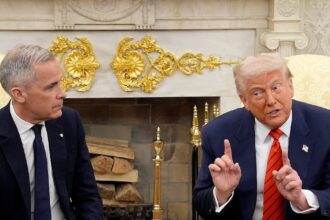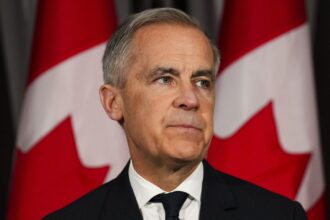In the gilded halls of European power last week, former Bank of England governor and current Finance Minister Mark Carney demonstrated Canada’s determination to diversify its diplomatic and economic relationships beyond North American borders. His high-profile meetings with European financial leaders weren’t merely routine diplomacy—they represented a calculated strategic pivot as Canada prepares for potential turbulence in US-Canadian relations.
Carney’s European tour included substantive discussions with European Central Bank President Christine Lagarde, German Finance Minister Christian Lindner, and French Economy Minister Bruno Le Maire—heavyweights who collectively influence the direction of the European economy. The timing speaks volumes, coming just weeks before a US presidential election that could return Donald Trump to the White House.
“Canada must establish stronger European partnerships as insurance against American unpredictability,” Carney stated during his press conference in Brussels. “Our economic resilience depends on diversification, not concentration.”
Financial analysts note that during Trump’s previous administration, Canada faced unexpected tariffs on steel and aluminum under dubious “national security” justifications. The renegotiation of NAFTA into the USMCA created months of economic uncertainty that rattled Canadian markets and investment planning.
What separates Carney from previous Finance Ministers is his exceptional international credibility. As the only person to have headed two G7 central banks, his relationships with global financial leaders run deep. European officials clearly value his perspective—evidenced by the unusual level of access granted during this trip and the joint statements emphasizing “shared democratic values” and “rules-based trade.”
Dr. Eliza Montgomery, professor of international trade at the University of Toronto, told CO24 Business that Carney’s European outreach carries significant strategic importance. “This isn’t just relationship maintenance—it’s relationship insurance. Canada is signaling that while the US remains our dominant trading partner, we’re actively building alternatives.”
The discussions reportedly centered on expanded Canada-EU trade under the Comprehensive Economic and Trade Agreement (CETA), energy security cooperation, and potential coordination on climate finance initiatives. Concrete outcomes included preliminary agreements to establish a Canada-EU Critical Minerals Partnership and a Digital Trade Framework.
While in Paris, Carney delivered a pointed speech at Sciences Po emphasizing that “middle powers must work together in an era where larger nations sometimes act unilaterally.” The subtext wasn’t difficult to decode—a reference to both American and Chinese economic nationalism.
Canadian officials privately acknowledge that strengthening European ties serves both economic and political purposes. A senior Finance Department official, speaking on background to CO24 Politics, admitted: “We learned during the previous Trump administration that Canada needs more diplomatic leverage. Building stronger European relationships gives us options and potentially more bargaining power with Washington.”
Trade data supports the strategy. While 75% of Canadian exports still go to the United States, Europe represents the largest potential growth market for Canadian services, agricultural products, and clean technology. European investment in Canada has increased 26% since 2020, providing crucial capital for infrastructure and manufacturing.
As global economic alignments shift amid rising protectionist sentiment, Canada’s diplomatic positioning becomes increasingly consequential. Carney’s European mission may signal the beginning of a more sophisticated multi-vector approach to international relations—maintaining the critical American relationship while simultaneously building meaningful alternatives.
The question now facing Canadian policymakers is whether these European overtures will translate into tangible economic benefits, or simply serve as diplomatic insurance against American unpredictability in an increasingly uncertain global landscape.

























